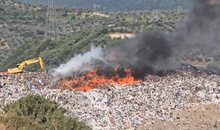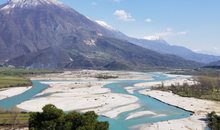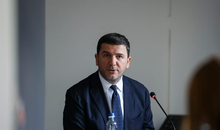
 Flash News
Flash News
Accident at "Shkalla e Tujanit", truck overturns in the middle of the road, driver injured
Vlora by-pass, work delays and cost increases
Milan are expected to give up on the transfer of Granit Xhaka
Inceneratori jashtë funksionit, përfshihet nga flakët fusha e mbetjeve në Elbasan
Accident on the Lezhë-Shëngjin axis, one injured
Disconnecting the Balkans from Russian gas still remains a challenge, Albania has no infrastructure to import

A new report from Global Energy Monitor and Bankwatch Network says that Western Balkan countries will face difficulties in their energy transition plans.
The report stressed that new EU- and US-backed energy plans to make Western Balkan countries independent of Russian gas will be costly, as some countries currently do not import gas or lack the infrastructure to do so, which that will make it more difficult for them to transition to green energy, despite the natural potential that the countries have, reports Balkan Insight .
According to the report, plans for €3.5 billion of new gas-fired power plants, gas pipelines and liquefied natural gas (LNG) terminals in the Western Balkans, promoted by European Union and US institutions, would force countries to import too much more gas than they have in the past and have delayed the region's shift to domestic clean energy production.
"In 2021, the Western Balkans consumed only 3.7 billion cubic meters (bcm) of gas, or 4 percent of what Germany used in the same year. Half of these countries do not import gas from international markets" , the report emphasizes.
He explained that by building costly new gas systems, in some cases from the ground up, these economies could present new economic and energy security risks to an already challenging energy transition.
The reason for building new pipelines and terminals is to replace Russian gas imports.
"However, most countries in the Western Balkans, unlike those in the EU, do not rely heavily on gas or face the same urgency to replace existing gas supplies," the report emphasized.
In some countries of the Western Balkans, gas is not the main way to get energy, and in some other countries there is no infrastructure to import it.
"The six countries of the Western Balkans - Albania, Bosnia and Herzegovina (BiH), Kosovo, Montenegro, North Macedonia and Serbia - produce electricity mainly from coal and hydropower plants. "Bosnia and Herzegovina, North Macedonia and Serbia use gas mainly for central heating and some industries, and the last two also use it for electricity ," the report states. "Albania, Kosovo and Montenegro do not use gas at all; they do not have the infrastructure to import gas from international markets and they do not have functional distribution networks".
The press release from Global Energy Monitor and Bankwatch on Thursday stressed that the initiative would make it more difficult for the region to switch to green energy and could delay their EU accession.
"For a region with significant solar and wind energy potential, plans for new gas infrastructure will also bring new obstacles to EU membership efforts, as the move conflicts with provisions of the Energy Community Treaty aimed at among other things to harmonize green energy efforts. of the region with that of the EU" , it is further stated.
Latest news








Golem and Qerret without water at the peak of the tourist season
2025-07-01 21:09:32

Euractiv: Italy-Albania migrant deal faces biggest legal challenge yet
2025-07-01 20:53:38
BIRN: Brataj and Fevziu victims of a 'deepfake' on Facebook
2025-07-01 20:44:00

Vlora by-pass, work delays and cost increases
2025-07-01 20:24:29



Milan are expected to give up on the transfer of Granit Xhaka
2025-07-01 19:41:25


The silent but rapid fading of the towers' euphoria
2025-07-01 18:58:07
Donald Trump's daughter says 'goodbye' to June with photos from Vlora
2025-07-01 18:48:47

Tirana vote recount, Alimehmeti: CEC defended manipulation
2025-07-01 18:15:05

Left Flamurtari, striker signs with another Albanian club
2025-07-01 17:43:14
Accident on the Lezhë-Shëngjin axis, one injured
2025-07-01 17:19:35
June temperature records, Italy limits outdoor work
2025-07-01 17:03:15

Meet Kozeta Miliku, named one of the top five scientists in Canada
2025-07-01 16:32:12
"Arsonist" arrested for repeatedly setting fires in Vlora (NAME)
2025-07-01 16:29:45

The ecological integrity of the Vjosa River risks remaining on paper
2025-07-01 16:09:40
Heat Headache/ Causes, Symptoms and Measures You Should Take
2025-07-01 16:01:13
UN: The world must learn to live with heat waves
2025-07-01 15:54:50

Three cars collide in Tirana, one of them catches fire
2025-07-01 15:38:16

Shehu: Whoever doesn't want Berisha, doesn't want the opposition 'war'!
2025-07-01 15:19:20
Berisha requests the OSCE Assembly: Help my nation vote freely
2025-07-01 15:11:46
Be careful with medications: Some of them can harm your sex life
2025-07-01 15:00:32

'Golden Bullet'/ Lawyers leave the courtroom, Altin Ndoc's trial postponed again
2025-07-01 14:44:52
EU changes leadership, Kosovo in a number of places
2025-07-01 14:40:01
Should we drink a lot of water? Experts are surprised: You risk hyponatremia
2025-07-01 14:30:20



Lëpusha beyond Rama's postcards: A village that is being silently abandoned
2025-07-01 13:41:56
Scorching temperatures in France close the Eiffel Tower
2025-07-01 13:29:35
Media: China, Iran and North Korea, a threat to European security
2025-07-01 13:20:12
Albania drops in global index: Less calm, more insecure
2025-07-01 13:09:35
Road collapses, 5 villages in Martanesh risk being isolated
2025-07-01 13:03:04

Këlliçi: Opposition action to be decided in September
2025-07-01 12:48:49
Four tips for coping with the heat wave
2025-07-01 12:38:53
Car hits pedestrian on Transbalkan road
2025-07-01 12:27:09
Authors of 9 robberies, Erjon Sopoti and Abdullah Zyberi arrested
2025-07-01 12:15:56

He abused his minor daughter, this is a 36-year-old man in custody in Fier
2025-07-01 11:50:34
The constitution of the Kosovo Assembly fails for the 40th time
2025-07-01 11:40:08




EU confirms support for the Western Balkans
2025-07-01 10:50:45
Serious in Fier! Father sexually abuses his minor daughter
2025-07-01 10:32:33
One year since the passing of the colossus of Albanian literature, Ismail Kadare
2025-07-01 10:25:26


They supplied the 'spaçators' with drugs, two young men are arrested in Tirana
2025-07-01 09:54:09
Europe is "scorching", how dangerous are high temperatures?
2025-07-01 09:48:56


Nigel Farage in Albania: but why?
2025-07-01 09:13:12
Xama: The "Partizani" dossier is quite weak and without facts!
2025-07-01 09:04:47

Foreign exchange, the rate at which foreign currencies are sold and bought
2025-07-01 08:35:39
Fabricators again warn of factory closures and job cuts
2025-07-01 08:21:30
Horoscope, what do the stars have in store for you today?
2025-07-01 08:08:59
Scorching hot, temperatures reaching 40°C
2025-07-01 07:57:12
Morning Post/ In 2 lines: What mattered yesterday in Albania
2025-07-01 07:42:59
Recount after May 11, Braho: I had no expectations for massive vote trafficking
2025-06-30 22:54:18

Second hearing on the protected areas law, Zhupa: Unconstitutional and dangerous
2025-06-30 22:18:46



Israel-Iran conflict, Bushati: Albanians should be concerned
2025-06-30 21:32:42

Fuga: Journalism in Albania today in severe crisis
2025-06-30 21:07:11
"There is no room for panic"/ Moore: Serbia does not dare to attack Kosovo!
2025-06-30 20:49:53

Temperatures above 40 degrees, France closes nuclear plants and schools
2025-06-30 20:28:42
Lavrov: NATO is risking self-destruction with new military budget
2025-06-30 20:13:54
Turkey against the "Bektashi state" in Albania: Give up this idea!
2025-06-30 20:03:24

Accused of sexual abuse, producer Diddy awaits court decision
2025-06-30 19:40:44


